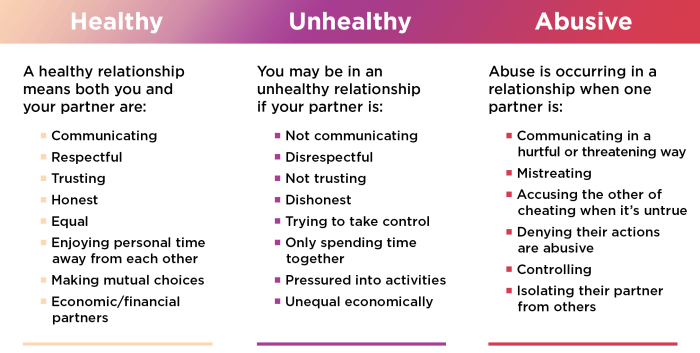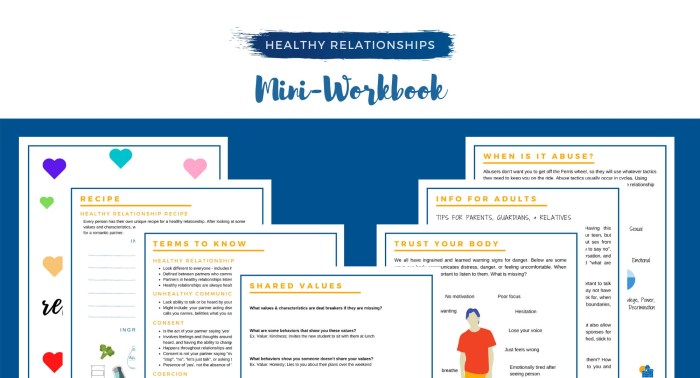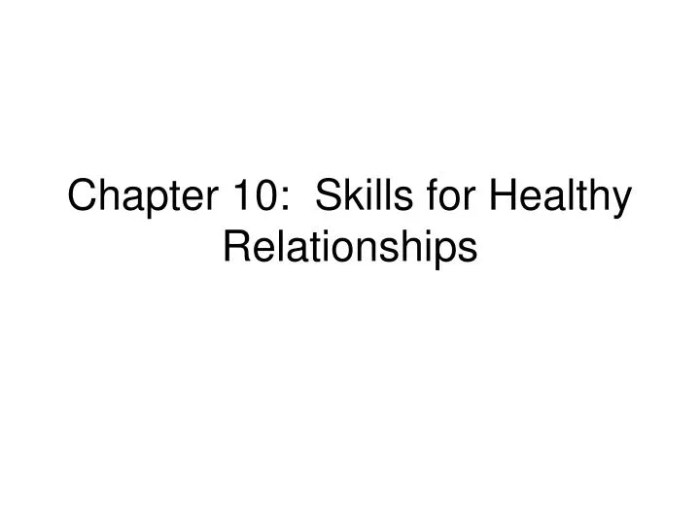Chapter 6 skills for healthy relationships are a crucial component of any successful partnership. This chapter provides a comprehensive overview of the essential skills that couples need to build and maintain strong, fulfilling relationships. From effective communication and conflict resolution to emotional regulation and setting boundaries, this guide offers practical strategies and insights to help couples navigate the challenges and reap the rewards of a healthy relationship.
Throughout this chapter, we will explore the importance of active listening, empathy, and nonverbal communication in fostering open and honest dialogue. We will also delve into conflict resolution techniques, emphasizing the significance of finding common ground and using “I” statements.
Additionally, we will discuss the concept of emotional regulation and provide techniques for identifying and managing emotions effectively.
Communication Skills
Effective communication is the cornerstone of healthy relationships. It allows partners to express their thoughts, feelings, and needs, fostering understanding, connection, and conflict resolution.
Active Listening and Empathy
- Active listening involves paying full attention to what your partner is saying, both verbally and nonverbally.
- Empathy is the ability to understand and share the emotions of others, putting yourself in their shoes.
Effective Communication Techniques
- Use “I” statements to express your needs without blaming your partner.
- Be clear and direct in your communication, avoiding vague or ambiguous language.
- Listen to your partner’s perspective without interrupting or dismissing their feelings.
Nonverbal Communication
Nonverbal communication, such as body language, facial expressions, and eye contact, conveys emotions and intentions. It can complement or contradict verbal communication.
Conflict Resolution: Chapter 6 Skills For Healthy Relationships

Conflicts are inevitable in relationships, but how they are managed can determine the health and longevity of the relationship.
Constructive Conflict Resolution
- Stay calm and respectful, even when emotions are running high.
- Identify the underlying issues and needs of both partners.
- Seek common ground and work together to find solutions that meet the needs of both.
“I” Statements and Avoiding Blame
Using “I” statements helps you express your feelings without blaming your partner. For example, instead of saying “You never listen to me,” you could say “I feel unheard when I’m not given the opportunity to speak.”
Emotional Regulation
Emotional regulation is the ability to manage and express emotions in a healthy way.
Identifying and Managing Emotions
- Mindfulness practices can help you become more aware of your emotions.
- Self-soothing strategies, such as deep breathing or exercise, can help you calm down when emotions are running high.
Expressing Emotions Healthily, Chapter 6 skills for healthy relationships
It’s important to express emotions in a way that is respectful of your partner and yourself. Avoid bottling up emotions or lashing out.
Boundaries and Respect

Healthy boundaries define the limits of acceptable behavior in a relationship.
Setting and Communicating Boundaries
- Communicate your boundaries clearly and directly.
- Respect your own boundaries and those of your partner.
- Negotiate boundaries when necessary, but don’t compromise your own well-being.
Respecting Autonomy
Respecting your partner’s autonomy means giving them the space and freedom to make their own choices and pursue their own interests.
Trust and Vulnerability

Trust and vulnerability are essential for healthy relationships.
Importance of Trust
- Trust allows you to feel safe and secure in your relationship.
- It fosters intimacy and connection.
- Trust takes time to build and can be easily broken.
Vulnerability and Intimacy
Vulnerability is the willingness to share your thoughts, feelings, and experiences with your partner. It can foster intimacy and connection.
Support and Encouragement
Providing emotional and practical support to each other is vital for healthy relationships.
Emotional Support
- Be there for your partner when they need you.
- Listen to them without judgment.
- Offer encouragement and reassurance.
Practical Support
Practical support involves helping your partner with tasks and responsibilities.
Sexual Health and Intimacy

Open and honest communication about sexual health and intimacy is crucial for healthy relationships.
Safe Sex Practices
- Use condoms to prevent sexually transmitted infections (STIs).
- Get regular STI screenings.
- Communicate your sexual history and preferences with your partner.
Fulfilling Sexual Relationship
A fulfilling sexual relationship involves mutual pleasure, respect, and communication.
Values and Goals
Shared values and goals create a strong foundation for relationships.
Alignment of Values
- Identify your core values and those of your partner.
- Find common ground and align your values as much as possible.
Working Towards Common Goals
Having common goals gives you something to work towards together, fostering connection and purpose.
FAQ
What are the key skills for healthy relationships?
Effective communication, conflict resolution, emotional regulation, setting and respecting boundaries, and fostering trust and vulnerability are essential skills for healthy relationships.
How can I improve my communication skills in a relationship?
Practice active listening, use “I” statements, and pay attention to nonverbal cues. Focus on expressing your needs and feelings clearly and respectfully.
What are some strategies for resolving conflicts constructively?
Find common ground, avoid blaming language, and focus on finding solutions that meet the needs of both partners. Use “I” statements and active listening to facilitate a respectful dialogue.